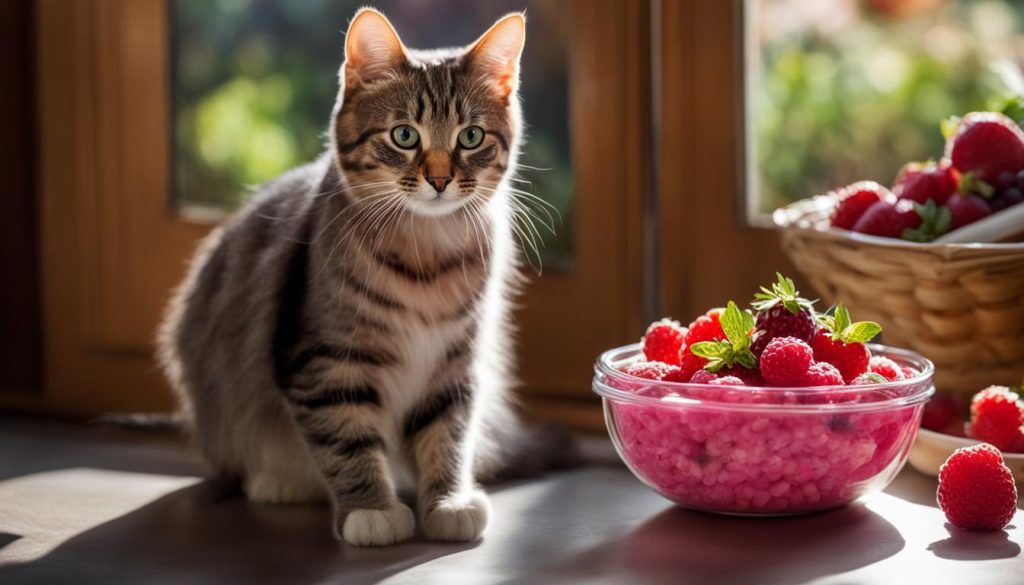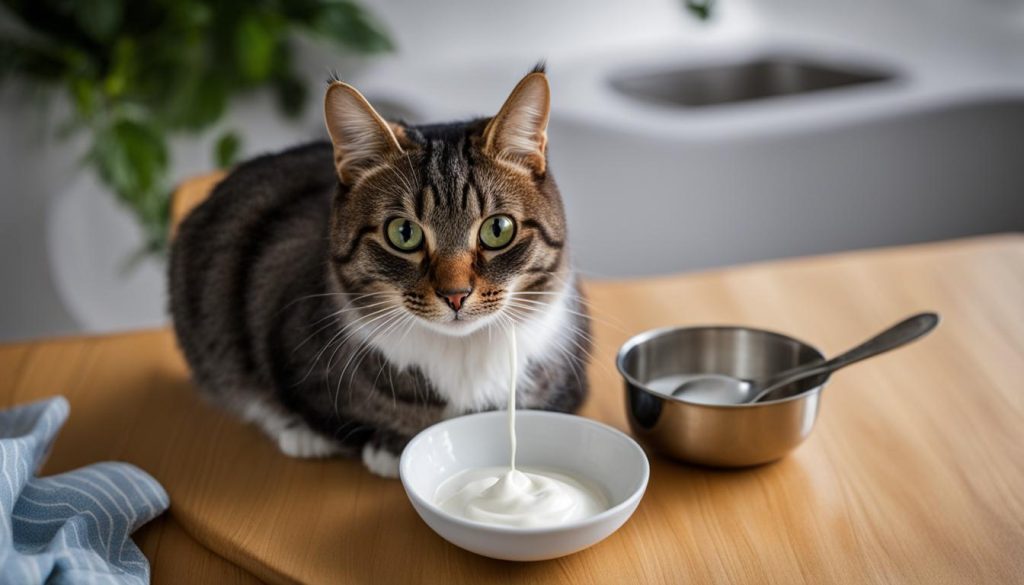Hello, cat lovers! Today, I want to address a common question among cat owners: can cats eat yogurt? As you may already know, cats have unique dietary needs, and it’s essential to ensure that any food we offer them aligns with their well-being. So, let’s delve into the world of yogurt and cats to find out if it’s safe and beneficial for our feline friends.
Can Cats Eat Yogurt? Yes, they can. But it is not essential.
- Cats can eat plain and unsweetened yogurt in small amounts as an occasional treat.
- It’s crucial to consult with a veterinarian before introducing yogurt into your cat’s diet.
- Yogurt contains beneficial nutrients, but these are already present in a balanced cat diet.
- If you want to add probiotics to your cat’s diet, consult your vet for cat-specific supplements.
- Always observe your cat’s reaction to yogurt and adjust portions accordingly.
Can Cats Eat Yogurt? The Facts You Need to Know
Cats and yogurt may not seem like a typical pairing, but the truth is, cats can eat yogurt – with some important considerations. While many cats are lactose intolerant and have difficulty digesting dairy products, yogurt is often easier on their stomachs. This is because yogurt contains live bacteria that aids in digestion, making the lactose content more tolerable for cats.
However, it’s crucial to choose the right kind of yogurt for your feline friend. Plain and unsweetened yogurt is the safest option. Cats should never consume flavored or sweetened varieties, as these can contain harmful ingredients or excessive amounts of sugar. Stick to plain yogurt without any additives.
Feeding cats yogurt should be done in moderation and as an occasional treat. It’s important to closely monitor your cat’s reaction to yogurt, as some cats may still experience gastrointestinal upset even with the lower lactose content. If your cat shows signs of diarrhea or vomiting after consuming yogurt, they may have an intolerance or sensitivity to it. In these cases, it’s best to avoid feeding them yogurt and consult with a veterinarian for alternative options.
Before introducing yogurt into your cat’s diet, it’s always a good idea to seek professional guidance. A veterinarian can provide personalized advice based on your cat’s specific health needs. They can determine if yogurt is safe for your cat and suggest appropriate portion sizes or alternative sources of probiotics if needed.
While cats can eat yogurt, it’s important to exercise caution and consider your cat’s individual dietary requirements. Plain and unsweetened yogurt can be a safe and enjoyable treat for some cats, but always consult with a veterinarian to ensure it is suitable for your feline companion’s overall well-being.
The Health Benefits of Yogurt for Cats
While yogurt can be enjoyed by some cats, it’s important to note that the health benefits of yogurt for cats are limited. Yogurt does contain protein, calcium, vitamins B2 and B12, and minerals like potassium and magnesium. However, these nutrients are already present in a cat’s complete and balanced diet, so there is no need to supplement their food with yogurt.
The live bacteria in yogurt, known as probiotics, can aid in digestion. However, it’s best to consult with a veterinarian before adding probiotics to your cat’s diet to ensure they receive a cat-specific probiotic supplement with a more beneficial effect.
It’s important to note that cats should not rely solely on yogurt for their nutritional needs, and their diet should primarily consist of a high-quality cat food recommended by a veterinarian.

How to Safely Feed Yogurt to Your Cat
If you want to give yogurt to your cat as a treat, it’s important to follow some guidelines to ensure their safety. Choose plain and unsweetened yogurt without any added fruits, sugars, or artificial sweeteners. Flavored and high-calorie yogurts should be avoided, as they may contain ingredients that can be harmful to cats. Feeding cats yogurt is best done in moderation, as excess consumption can lead to digestive issues.
Start by offering a small amount of yogurt to your cat and observe their reaction. If they tolerate it well and show no signs of adverse effects, you can continue giving them a small portion, not exceeding three to five tablespoons per week. Remember to consider the overall caloric intake of your cat’s diet and ensure that treats, including yogurt, do not make up more than 10% of their daily caloric intake.

It’s always a good idea to consult with a veterinarian before introducing any new food into your cat’s diet. They can provide personalized recommendations and advice based on your cat’s specific needs and health condition. Your veterinarian will also be able to assess whether yogurt for cats is suitable for your furry friend and offer alternative options if needed. By following these guidelines, you can safely incorporate yogurt into your cat’s diet as an occasional treat.
Conclusion
Cats can eat yogurt as a safe and occasional treat. It’s important to choose plain and unsweetened yogurt to avoid any potential harm to their health. While yogurt does contain beneficial nutrients and probiotics, such as protein, calcium, and vitamins, these are already present in a cat’s complete and balanced diet. Therefore, yogurt should not be relied upon as a primary source of nutrition for cats.
Before introducing yogurt into your cat’s diet, it’s always best to consult with a veterinarian to ensure it is appropriate for your individual cat. They can provide expert advice and recommend dietary alternatives if needed. Additionally, monitoring your cat’s reaction to yogurt is crucial. If any digestive issues or adverse effects occur, it may be a sign that your cat is not tolerating it well.
Feeding cats yogurt can have some benefits, but it should be done with caution and in moderation. Remember that your cat’s diet should primarily consist of a high-quality cat food recommended by a veterinarian. By taking these precautions, you can ensure that your cat enjoys the occasional yogurt treat while maintaining their overall health and well-being.
FAQ
Can cats eat yogurt?
Yes, cats can eat yogurt, but it’s important to note that not all types of yogurt are safe for feline consumption.
Is yogurt safe for cats?
Plain and unsweetened yogurt is generally safe for cats to eat in small amounts as a treat, but it’s crucial to consult with a veterinarian before introducing yogurt into your cat’s diet.
What are the benefits of yogurt for cats?
Yogurt contains nutrients like protein, calcium, vitamins B2 and B12, and minerals such as potassium and magnesium. However, these nutrients are already present in a cat’s complete and balanced diet.
Can I feed my cat yogurt as a treat?
Yes, you can give your cat yogurt as an occasional treat, but it’s important to choose plain and unsweetened yogurt and only offer small amounts.
How do I safely feed yogurt to my cat?
Start by offering a small amount of yogurt to your cat and observe their reaction. If they tolerate it well and show no signs of adverse effects, you can continue giving them a small portion, not exceeding three to five tablespoons per week.






